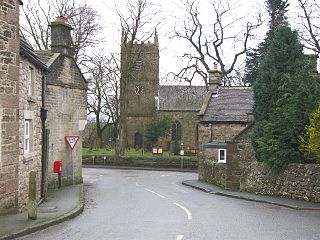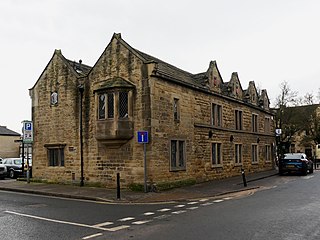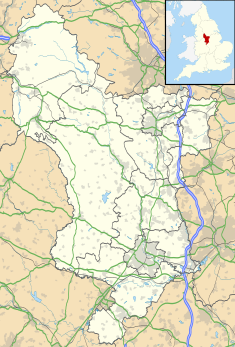
Derbyshire is a ceremonial county in the East Midlands of England. It borders Greater Manchester, West Yorkshire, and South Yorkshire to the north, Nottinghamshire to the east, Leicestershire to the south-east, Staffordshire to the south and west, and Cheshire to the west. Derby is the largest settlement, and Matlock is the county town.

Buxton is a spa town in the Borough of High Peak, Derbyshire, in the East Midlands region of England. It is England's highest market town, sited at some 1,000 feet (300 m) above sea level. It lies close to Cheshire to the west and Staffordshire to the south, on the edge of the Peak District National Park. In 1974, the municipal borough merged with other nearby boroughs, including Glossop, to form the local government district and borough of High Peak.

Bakewell is a market town and civil parish in the Derbyshire Dales district of Derbyshire, England, known for Bakewell pudding. It lies on the River Wye, 15 miles (23 km) south-west of Sheffield. It is the largest settlement and only town within the boundaries of the Peak District National Park. At the 2011 census, the population of the civil parish was 3,949. It was estimated at 3,695 in 2019. The town is close to the tourist attractions of Chatsworth House and Haddon Hall.

Matlock is the county town of Derbyshire, England. It is in the south-eastern part of the Peak District, with the National Park directly to the west. The spa resort of Matlock Bath is immediately south of the town as well as Cromford lying further south still. The civil parish of Matlock Town had a population in the 2021 UK census of 10,000.

Dronfield is a town in North East Derbyshire, England, which includes Dronfield Woodhouse and Coal Aston. It lies in the valley of the River Drone between Chesterfield and Sheffield. The Peak District National Park is three miles (4.8 km) to the west. The name comes from the Old English Dranfleld, probably meaning an open land infested with drone bees.

Lady Manners School is an English secondary school located in Bakewell, a market town in the Peak District National Park, Derbyshire. It was founded on 20 May 1636 by Grace, Lady Manners, who lived at Haddon Hall, the current home of Lord and Lady Edward Manners, and has also in the past been known as the Bakewell Grammar School. It is now a member of the Peak 11 group of secondary schools in the Peak District.

The Market House is a historic building in the Main Street in Winster, a town in Derbyshire, England. The building, which is currently in use a visitor exhibition centre, is a Grade II* listed building.

All Saints' Church, Bakewell, is the parish church of Bakewell, Derbyshire, England. It is a Grade I listed building.

Elton is a village and civil parish in the Derbyshire Dales district of Derbyshire, England, and lies within the Peak District. Its nearest towns are Bakewell and Matlock.

Chelmorton is a village and a civil parish in Derbyshire, England. It is in the Derbyshire Dales district and the nearest towns are Buxton to the northwest and Bakewell to the east. The name Chelmorton derives from Old English and probably means 'Ceolmaer's hill'. The population of the civil parish as of the 2011 census was 322.

Amersham Market Hall, formerly known as Amersham Town Hall, is a municipal building in the High Street in Amersham, Buckinghamshire, England. The structure is a Grade II* listed building.

The Old Town Hall is a municipal building in London Road, Chertsey, Surrey, England. The structure, which was the main civic venue for the town, is a Grade II listed building.

The Old Town Hall is a building on Church Street in the market town of Poulton-le-Fylde in Lancashire, England. Located to the north of Market Place, the building was originally a public house before becoming a municipal building and then reverting to use as a public house.

Clarence House, previously the New Inn (1785–1830) and the Clarence Hotel (1830–1972), is a former coaching inn and hotel in Brighton, part of the English coastal city of Brighton and Hove. The only surviving coaching inn of many which used to stand on North Street, Brighton's main commercial thoroughfare, it retains much of its original "severely plain" Georgian appearance, with Classical features and mathematical tiles; but the interior has been changed since its closure in 1972 and conversion into a mixed-use commercial building. The four-storey structure, which is in a conservation area and which has been listed at Grade II by Historic England for its architectural and historical importance, is empty and has been vandalised and squatted repeatedly, but planning applications were raised in 2021 and 2022 for the creation of two flats and a new restaurant within the building.

Bakewell Town Hall is a municipal building in Anchor Street in Bakewell, a town in Derbyshire in England. The building, which serves a community events venue, is also the home of Bakewell Town Council.

Bakewell Market Hall is a historic building in the town of Bakewell, in Derbyshire, in England.

The Old Town Hall, also known as The Old Courthouse, is a former municipal building in Main Street, Haltwhistle, a town in Northumberland, England. The building, which is currently in use in part as a hair salon, and in part as commercial offices, is a Grade II listed building.

Ockwell's Glove Factory, also known as the Old Town Hall, is a historic building in Cricklade, a town in Wiltshire in England. The building, which currently accommodates the offices and meeting place of Cricklade Town Council, is a Grade II listed building.

The Old Town Hall is a former municipal building in New Street in Paignton, a town in Devon, in England. It served as the offices of Paignton Urban District Council until 1946, but was later converted for residential use.

Dronfield Civic Hall is a municipal building in the Civic Centre in Dronfield, a town in Derbyshire, in England. The building accommodates the offices and meeting place of Dronfield Town Council and also operates as a community events venue.





















